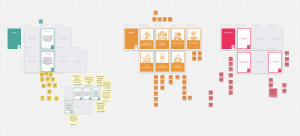The future of work is often assumed to be one where everybody becomes a flexible entrepreneur, accessing work at any time one pleases through a sleek digital platform. The so-called gig economy promises liberation from the 9 to 5 routine and autonomy from a boss breathing down one’s neck. The realities of platform work are nevertheless much more complicated than this optimistic view, with job insecurity and generalised precarity amongst workers representing serious reasons for concern.
Part of the Leverhulme Trust funded project Doing gig work: Social implications of platform-based food deliveries, which aims to investigate the working conditions in the gig economy, Cosmin Popan (Manchester Metropolitan University), David Pérez (Imagination Lancaster) and Jamie Woodcock (Open University) organised a workshop with platform food couriers based in Manchester. We used a deck of virtual cards to engage cyclists and scooter riders in an online conversation about the future of work.
At the end of April, we gathered virtually a handful of food delivery workers who agreed to leave work aside for two hours and engage in a playful activity aiming to address the question ‘When work doesn’t work, what is to be done?’ Using their own vivid and powerful stories of precarious work collected through ethnographic research, we proceed to a role-play game, inviting couriers to co-create solutions to the common problems they encounter during their work shifts.

In a work environment characterised by a low retention rate and high job atomisation, thinking about how to improve everyday working conditions can be a difficult task. Yet, we believe that improvements in the workplace are only possible when workers organise and voice their concerns collectively. Through the workshop, we explored some of the challenges that couriers in Manchester (and elsewhere too) face on a regular basis. They range from a lack of app transparency and long waiting times to difficulties to communicate with the companies contracting them and health and safety concerns. We invited riders to play the roles of different parties such as restaurant managers, workers associations, platform owners and local and national governments to imagine more positive futures for the gig economy.
Through our exercise, we discovered not only that, contrary to common understanding, riders learn from each other, express empathy and build solidarity with colleagues, but also that they should and indeed have a strong voice that must be listened to and considered more attentively and seriously. Any discussion about the future of work must include these workers whose labour is often hidden and underappreciated, yet who represent the very backbone of the smart cities of tomorrow.
